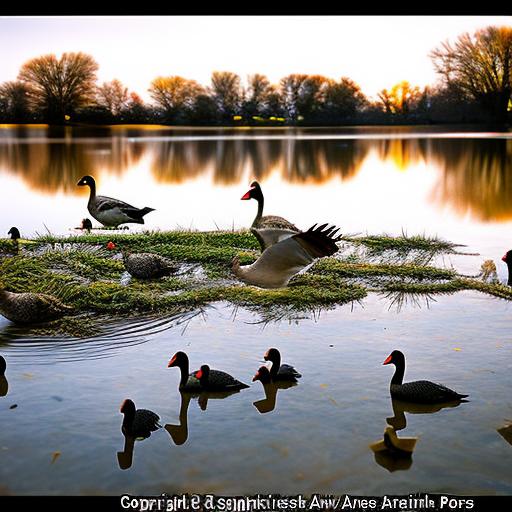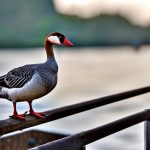Geese overpopulation in Columbus, Ohio has become a significant issue in recent years. The increasing number of geese has led to various problems, including damage to the environment, public health concerns, and safety hazards. The overpopulation of geese is primarily attributed to the availability of food sources, lack of natural predators, and favorable nesting and breeding conditions. As a result, the geese have become a nuisance in public areas, particularly around ponds and water bodies where they congregate in large numbers. The excessive presence of geese has led to the degradation of water quality, destruction of vegetation, and an increase in fecal matter, posing a threat to the ecosystem and public health. Additionally, the accumulation of geese in these areas has raised concerns about aggressive behavior towards humans and potential collisions with aircraft at nearby airports. It is crucial to address the geese overpopulation issue in Columbus, Ohio to mitigate these negative impacts and ensure the well-being of the environment and the community.
The overpopulation of geese in Columbus, Ohio has become a pressing concern that requires immediate attention and effective management strategies. The excessive presence of geese has resulted in various environmental, health, and safety issues, necessitating the implementation of measures to control their population and minimize their impact on the ecosystem and public spaces. Understanding the factors contributing to the geese overpopulation, such as abundant food sources and favorable nesting conditions, is essential in developing comprehensive solutions to address the issue. By recognizing the root causes of the problem, it becomes possible to devise targeted interventions that can effectively manage the geese population and mitigate their negative effects on the environment and human well-being. It is imperative for local authorities and stakeholders to collaborate in implementing sustainable and humane approaches to address the geese overpopulation in Columbus, Ohio and ensure the preservation of natural habitats and public spaces.
Key Takeaways
- Geese overpopulation in Columbus, Ohio is a growing problem that impacts the local ecosystem and community.
- Geese can have a detrimental impact on ponds and water bodies, leading to water pollution and damage to vegetation.
- Non-lethal methods such as using trained dogs, installing decoys, and employing repellents can effectively keep geese away from ponds.
- Creating physical barriers like fences, netting, and landscaping features can deter geese from accessing ponds and water bodies.
- Sound and visual deterrents such as lasers, scarecrows, and noise-making devices can be used to discourage geese from congregating in certain areas.
The impact of geese on ponds and water bodies
The overpopulation of geese in Columbus, Ohio has had a significant impact on ponds and water bodies in the area. The excessive presence of geese has led to the degradation of water quality, destruction of aquatic vegetation, and an increase in fecal matter, posing a threat to the ecological balance of these habitats. The accumulation of geese in and around ponds and water bodies has resulted in the trampling and consumption of aquatic plants, leading to the loss of habitat for other wildlife species and disrupting the natural balance of these ecosystems. Furthermore, the high concentration of geese feces in these areas has contributed to nutrient loading and bacterial contamination, compromising water quality and posing potential health risks to humans and wildlife. The impact of geese on ponds and water bodies underscores the need for effective management strategies to mitigate their presence and preserve the ecological integrity of these vital habitats.
The overpopulation of geese in Columbus, Ohio has had detrimental effects on ponds and water bodies, necessitating urgent measures to address their impact on these critical ecosystems. The excessive presence of geese has resulted in the destruction of aquatic vegetation, degradation of water quality, and disruption of the natural balance within these habitats. The trampling and consumption of aquatic plants by geese have led to habitat loss for other aquatic species, affecting the overall biodiversity and ecological health of ponds and water bodies. Additionally, the accumulation of geese feces has contributed to nutrient loading and bacterial contamination, posing risks to the water quality and public health. It is essential to recognize the significant impact of geese on ponds and water bodies in Columbus, Ohio and implement proactive measures to manage their population and mitigate their adverse effects on these vital ecosystems.
Non-lethal methods to keep geese away from ponds
Non-lethal methods can be employed to keep geese away from ponds in Columbus, Ohio, without causing harm to the birds. One effective approach is habitat modification, which involves altering the landscape to make it less attractive to geese. This can include planting tall grasses or shrubs around ponds to create barriers that deter geese from accessing the water’s edge. Another non-lethal method is the use of repellents, such as grape seed extract or methyl anthranilate, which can be applied to grassy areas near ponds to discourage geese from foraging. Additionally, employing trained dogs to patrol pond areas can help deter geese from congregating by creating a perceived threat. These non-lethal methods offer humane ways to manage geese populations around ponds in Columbus, Ohio while minimizing their impact on the environment.
Non-lethal methods provide humane and effective ways to keep geese away from ponds in Columbus, Ohio without resorting to lethal measures. Habitat modification can be utilized to create barriers that discourage geese from accessing pond areas by altering the landscape with tall grasses or shrubs. This approach can effectively limit the birds’ access to water’s edge while preserving the natural habitat. Another non-lethal method involves using repellents such as grape seed extract or methyl anthranilate, which can be applied to grassy areas near ponds to deter geese from foraging in these locations. Additionally, employing trained dogs to patrol pond areas can help create a perceived threat that deters geese from congregating in these spaces. These non-lethal methods offer practical and humane solutions for managing geese populations around ponds in Columbus, Ohio while minimizing their impact on the environment.
Creating a physical barrier to deter geese
Creating a physical barrier around ponds can effectively deter geese from congregating in these areas in Columbus, Ohio. One approach is installing fencing or netting around pond perimeters to prevent geese from accessing the water’s edge. This physical barrier can discourage geese from entering pond areas while allowing other wildlife species to access these habitats freely. Another method is using floating barriers or buoys on ponds to create obstacles that deter geese from landing or swimming in these waters. These physical barriers offer practical solutions for managing geese populations around ponds in Columbus, Ohio while preserving the ecological integrity of these vital habitats.
Creating a physical barrier around ponds can serve as an effective deterrent to limit the presence of geese in these areas in Columbus, Ohio. Installing fencing or netting around pond perimeters can prevent geese from accessing the water’s edge, thereby discouraging their congregation in these spaces. This physical barrier can help maintain the ecological balance of pond habitats while minimizing the impact of geese overpopulation. Additionally, using floating barriers or buoys on ponds can create obstacles that deter geese from landing or swimming in these waters, further reducing their presence in these critical ecosystems. Implementing physical barriers offers practical solutions for managing geese populations around ponds in Columbus, Ohio while ensuring the preservation of these vital habitats.
Utilizing sound and visual deterrents
Sound and visual deterrents can be utilized to discourage geese from congregating around ponds in Columbus, Ohio. One approach is using propane cannons or electronic sound devices that emit loud noises at regular intervals to create a sense of danger for geese, prompting them to avoid these areas. Another method is employing visual deterrents such as predator decoys or reflective tape that can create a perceived threat for geese and deter them from congregating around ponds. These sound and visual deterrents offer non-invasive ways to manage geese populations around ponds in Columbus, Ohio while minimizing their impact on the environment.
Utilizing sound and visual deterrents provides non-invasive methods to discourage geese from congregating around ponds in Columbus, Ohio. Propane cannons or electronic sound devices can be used to emit loud noises at regular intervals, creating a sense of danger for geese and prompting them to avoid these areas. Additionally, employing visual deterrents such as predator decoys or reflective tape can create a perceived threat for geese, deterring them from congregating around ponds without causing harm to the birds. These sound and visual deterrents offer practical solutions for managing geese populations around ponds in Columbus, Ohio while minimizing their impact on the environment.
Implementing habitat modification to discourage geese

Implementing habitat modification can effectively discourage geese from congregating around ponds in Columbus, Ohio. This approach involves altering the landscape by planting tall grasses or shrubs around pond perimeters to create barriers that deter geese from accessing the water’s edge. Additionally, introducing native vegetation that is less palatable to geese can help reduce their attraction to pond areas. Implementing habitat modification offers a sustainable way to manage geese populations around ponds in Columbus, Ohio while preserving the natural balance of these vital habitats.
Implementing habitat modification provides a sustainable approach to discourage geese from congregating around ponds in Columbus, Ohio. Altering the landscape by planting tall grasses or shrubs around pond perimeters can create barriers that deter geese from accessing the water’s edge, limiting their presence in these areas. Introducing native vegetation that is less palatable to geese can further reduce their attraction to pond habitats while preserving the natural balance of these vital ecosystems. Implementing habitat modification offers practical solutions for managing geese populations around ponds in Columbus, Ohio while ensuring the preservation of these critical habitats.
Seeking professional help for geese management in Columbus, Ohio
Seeking professional help for geese management is essential for addressing the overpopulation of geese in Columbus, Ohio effectively. Professional wildlife management services can provide expertise in implementing humane and sustainable strategies for managing geese populations around ponds and other public spaces. These professionals can conduct thorough assessments of the local environment and develop tailored management plans that prioritize non-lethal methods while ensuring compliance with regulations and ethical standards. By seeking professional help for geese management, local authorities and stakeholders can effectively address the overpopulation of geese in Columbus, Ohio while promoting environmental conservation and public safety.
Seeking professional help for geese management is crucial for addressing the overpopulation of geese in Columbus, Ohio effectively. Professional wildlife management services can offer expertise in implementing humane and sustainable strategies for managing geese populations around ponds and other public spaces. These professionals can conduct thorough assessments of the local environment and develop tailored management plans that prioritize non-lethal methods while ensuring compliance with regulations and ethical standards. By seeking professional help for geese management, local authorities and stakeholders can effectively address the overpopulation of geese in Columbus, Ohio while promoting environmental conservation and public safety.
In conclusion, addressing the overpopulation of geese in Columbus, Ohio requires a comprehensive approach that prioritizes humane and sustainable strategies for managing their presence around ponds and other public spaces. Understanding the factors contributing to the overpopulation of geese is essential in developing targeted interventions that effectively mitigate their impact on the environment and public well-being. Implementing non-lethal methods such as habitat modification, creating physical barriers, utilizing sound and visual deterrents, and seeking professional help for geese management are crucial steps towards addressing this issue effectively while ensuring environmental conservation and public safety. By implementing proactive measures to manage geese populations in Columbus, Ohio, it becomes possible to preserve the ecological integrity of vital habitats and promote harmonious coexistence between humans and wildlife.
If you’re looking for effective ways to keep geese away from your pond in Columbus, Ohio, you might be interested in learning more about the benefits of raising chickens as a natural deterrent. According to Poultry Wizard, having a chicken coop near your pond can help deter geese from congregating in the area. To find out more about setting up a chicken coop and nest box to keep geese at bay, check out their article on chicken coop nest boxes.
FAQs
What are some effective methods to keep geese away from a pond in Columbus, Ohio?
Some effective methods to keep geese away from a pond in Columbus, Ohio include installing fencing, using decoys or scare tactics, applying repellents, and modifying the landscape to make it less attractive to geese.
Is it legal to use certain methods to keep geese away from a pond in Columbus, Ohio?
It is important to check local regulations and laws regarding the use of certain methods to keep geese away from a pond in Columbus, Ohio. Some methods may require permits or have restrictions.
What are some natural ways to deter geese from a pond in Columbus, Ohio?
Some natural ways to deter geese from a pond in Columbus, Ohio include planting tall grasses or shrubs around the pond, using floating barriers, and introducing natural predators such as dogs or hawks.
Are there any professional services available to help keep geese away from a pond in Columbus, Ohio?
Yes, there are professional wildlife management services available in Columbus, Ohio that specialize in geese control and can provide effective solutions for keeping geese away from ponds.
Meet Walter, the feathered-friend fanatic of Florida! Nestled in the sunshine state, Walter struts through life with his feathered companions, clucking his way to happiness. With a coop that’s fancier than a five-star hotel, he’s the Don Juan of the chicken world. When he’s not teaching his hens to do the cha-cha, you’ll find him in a heated debate with his prized rooster, Sir Clucks-a-Lot. Walter’s poultry passion is no yolk; he’s the sunny-side-up guy you never knew you needed in your flock of friends!







